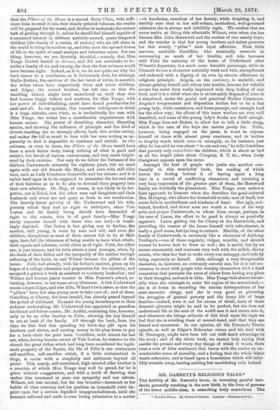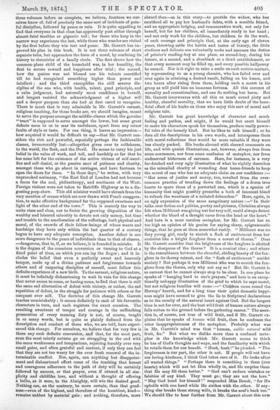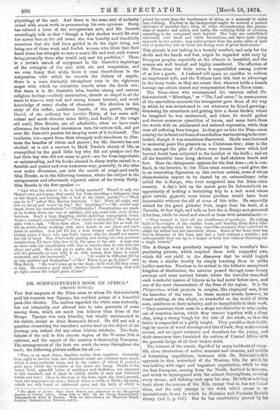MR. GARRETT'S RELIGIOUS TALES:* THE fertility of Mr. Garrett's brain,
in inventing painful inci- dents, generally resulting in the new birth, in the lives of persons of the lower middle-class, is something truly marvellous. The
• Crooked Places. By Edward Garrett. Loudon Stuaharvand Co-
three volumes before us complete, we believe, fourteen we our- selves know of, full of precisely the same sort of incidents of pain- ful discipline, followed by peace or ruin. It is quite appalling to find that everyone in that class has apparently past either through almost fatal troubles or gigantic toil ; for those who keep in the narrow way experience the last, while those who wander are visited by the first before they win rest and peace. Mr. Garrett has im- proved his plan in this book. It is not three volumes of short separate tales, but approaches the form of a novel, by confining its history to chronicles of a family circle. The first shows how the common-place child of the household was, in her humility, the first to secure reward and happiness after trial ; the second, how the genius was not blessed nor his talents sanctified till he had recognised something higher than power and intellect ; and the third exemplifies the still severer dis- cipline of the one who, with health, talent, good principle, and a calm judgment, had naturally most confidence in herself, and longest resisted the acknowledgment of a higher will and a deeper purpose than she had at first cared to recognise. There is much that is very admirable in Mr. Garrett's earnest, religious teaching, for these books are, we should imagine, meant to serve the purpose amongst the middle-classes which the genuine "tract" is supposed to serve amongst the lower, but some great defects seem to us to mar its usefulness, apart from any minor faults of style or taste. For one thing, it leaves an impression— how acquired it would be difficult to say—that Mr. Garrett con- siders the rich and powerful, especially perhaps the fashionable classes, irrecoverably lost—altogether given over to selfishness, to the world, the flesh, and the Devil. He seems to carry his just belief in the value of work, and toil, and hardship so far that he has none left for the existence of the active virtues of self-sacri- fice and self-denial, or the passive ones of patience and charity, amongst those who go about in carriages, and have footmen to open the doors for them. "In those days," he writes, with very unprovoked acrimony, "the East End of London had not become a focus for the zeal, philanthropy, and sentiment of the West. Foreign visitors were not taken to Ratcliffe Highway as to a dis- gusting peep-show. This old minister would have shrunk from the very mention of scenes which are now drawn with Fuseli-exaggera- tion, to make effective background for the supposed sweetness and light of the other end of the town." This is scarcely the way to unite class and class, nor to foster the growing disposition of the wealthy and leisured minority to devote not only money, but time and trouble to the amelioration of the sufferings, both physical and moral, of the crowds of their .fellow-beings of whose wants and hardships they have only within the last quarter of a century begun to have any adequate conception. Another defect is one more dangerous to the peace of individuals than to that of classes, —dangerous, that is, if, as we believe, it is founded in mistake. It is the dogma of the conscious conversion or turning to God at a fixed point of time, on which you can lay the finger ; and it in- cludes the belief that even a perfectly sweet and heavenly temper, made up of a divine patience and forgiveness towards others and of unsparing discipline of oneself, must follow this definite experience of a new birth. To the earnest, religious nature, it must be infinitely disheartening to wait in vain for this change that never seems to come, or having come, to find that there is still the same sad alternation of defeat with victory, or rather, the sad repetition of defeat, in the struggle for patience with others or for conquest over self. The doctrine of this change Mr. Garrett teaches unmistakably ; it comes definitely to each of his favourite characters in turn, and each registers the exact occasion. The resulting sweetness of temper and courage in the unflinching prosecution of every seeming duty is not, of course, taught in so many words, but is quite as plainly deduced from the description and conduct of those who, we are told, have experi- enced this change. For ourselves, we believe that for very few is there any such definite conversion, and that, for the most part, even the most saintly natures go on struggling to the end with the same weaknesses and temptations, rejoicing humbly over very small gains, and often grateful and content, if only they can feel that they are not too weary for the ever fresh renewal of the in- terminable conflict. Nor, again, can anything but disappoint- ment and disheartened effort come of the teaching that honest and courageous adherence to the path of duty will be certainly followed by success, or that prayer, even if uttered in all sim- plicity and childlike love, and without a thought of offering a bribe, as it were, to the Almighty, will win the desired good. Nothing can, on the contrary, be more certain, than that good- ness—even of the highest, and therefore of the humblest, kind— remains noblest by material gain ; and nothing, therefore, more
absurd than—as in this story—to provide the widow, who has sacrificed all to pay her husband's debts, with a sensible friend, and an appropriate lodging, and remunerative work, not only for herself, but for her children, all immediately ready to her hand ; and not only work for the children, but children to do the work, of such courage and principle that, at the early age of eleven years, throwing aside the habits and tastes of luxury, the little studious and delicate son voluntarily seeks and assumes the duties of printer's reading-boy at one place, an errand-boy, during his leisure, at a second, and a shoeblack at a third establishment, so that every moment may be filled up, and every possible halfpenny be earned. Nor is it right to raise a smile on such serious matters, by representing to us a young chemist, who has failed over and over again in attaining a desired result, falling on his knees, and
hours after rising from them, holding such a secret in his grasp as will yield him an immense fortuna. All this savours of unreality and sensationalism, and can do nothing but harm. But Mr. Garrett interweaves with all this so much sound piety and healthy, cheerful morality, that we have little doubt of the bene- ficial effect of his books on those who enjoy this sort of moral and religious tale.
Mr. Garrett has great knowledge of character and much feeling and pathos, and might, if he would but exert himself to make his characters speak for themselves, produce really power- ful tales of the homely kind. But he likes to talk himself ; so he does all the descriptions in his own words, and intersperses them- with moral reflections that would be more valuable if they were- less closely packed. His books abound with shrewd comments om life, and with quaint illustrations, not, however, always free from some coarseness, nor from some confusion of metaphor, nor from undeserved bitterness of sarcasm. Here, for instance, is a very far-fetched and very ugly illustration of what he rightly describes as the miscalled charity of wounding dear home-friends to keep. the secret of one who has no adequate claim on our confidence :— " Her sense of justice and mercy, too, revolted from the over- common practice of treading down the feelings of a dozen true, hearts to spare those of a perverted one, which is a species of humanity that might possibly prescribe a bath of innocent blood to refresh the weariness of a satiated debauchee." Here, again, is an ugly expression of the same sanguinary nature :—" In their talks over fiction and politics, poetry and pictures, Christian always felt when Millicent was giving out her very self, could always detect whether the blood of a thought came from the head or the heart." And here is a most careless metaphor, for Mr. Garrett has so too high an opinion of his genius for saying sharp, epigrammatic- things, that he goes at them somewhat rashly. "Millicent was no fiery young girl, ready to Snatch a flash of excitement from her anxieties like a bright foxglove from a covert of thorns." Does Mr. Garrett consider that the brightness of the foxglove is elicited by the sharpness of the thorns ? It is a comical idea ; and where- is the resemblance between the cheerful, abiding beauty of the fox- glove in its thorny retreat, and the "flash of excitement" amidst anxiety ? But perhaps it was Millicent who was to snatch the fox- glove from the thorns, only why not say so ? But Mr. Garrett L. so earnest that he cannot always stop to be clear. In one place he speaks of "hanging hard to one's prayers," and here is an excep- tionally unhappy illustration of the grief to which he says moral, but not religious families will come :—" Children came round the Harveys' hearth, and for a long time their quiet domestic happi- ness might have seemed to give the lie to Scriptural declarations as to the enmity of the natural heart against God. But the longest time is not for ever, and the best wild fruit of human nature always falls rotten to the ground before the gathering season." The asser- tion is, of course, not true of wild fruit, and if Mr. Garrett ex- plains that he speaks of human wild fruit, then he confesses the utter inappropriateness of the metaphor. Probably what was in Mr. Garrett's mind was that "human, unlike natural wild fruit, &e." But what we dislike more than a confused meta- phor is the knowledge which Mr. Garrett seems to think he has of God's thoughts and ways, and the familiarity with which he retails them for our benefit. "Hush, hush!" he pleaded. "The forgiveness is our part, the other is not. If people will not have our loving-kindness, I think God takes care of it. He looks after all wasted things." "Perhaps there is something in them (our hearts) which will not let Him wholly in, and He empties them that He may 611 them better." "God can't endure mistakes or falsities of any kind. They must go ; they are not the love." "May God bend her himself !" responded Mies Brook, "for Ile upholds with one hand while He strikes with the other. If any- thing else breaks those strong wills, it breaks the soul's back too.' We should like to hear further from Mr. Garrett about this newr
physiology of the soul. And there is the same sort of audacity mixed with much truth in pronouncing his own opinions. Hatty has refused a lover of the unregenerate sort, and Mr. Garrett accordingly tells us that "though a light shadow would flit over her merry face at the old name, she was humbly and thankfully conscious that she had been guided to do the right thing, not being one of those weak and foolish women who think that their band alone has strength to save a man's life and soul, such women being generally those who would only seal his perdition." There is a certain smack of enjoyment in Mr. Garrett's depictings of the struggles of the soul with sin and temptation, and we even fancy that while there is some cheerfulness in the resignation 'with which he records the victory of angels, there is a more distinctly triumphant tone in the righteous anger with which he chronicles results when the devils win. But there is in Mr. Garrett's tales, besides strong and earnest religious feeling—entirely unsectarian, church or chapel is all the same to him—a very real and strong human interest, and much knowledge of many shades of character. His sketches in this story of the selfish, ambitious Laurie, of the gentle, retiring David, of the ordinary but lovable Hatty, of her more self- reliant and much cleverer sister Milly, and finally, of the rough old maid, Miss Brooks, are all admirable, when we have made allowance for their most uncommon turn for serious talk, and got over Mr. Garrett's passion for keeping most of it to himself. The incidents, too—apart from their strangely well-timedness to illus- trate the benefits of virtue and prayer ; for Mr. Garrett has not studied, or is not a convert to Mark Twain's theory of life, as exemplified by the good little boy who did not prosper and the bad little boy who did not come to grief —are far from improbable or uninteresting, and his books abound in sharp truths stated in a forcible and quaint and even humorous way, generally, in the tales trow under discussion, put into the mouth of rough-and-ready Miss Brooks, as in the following instance, where the subject is the unregenerate and afterwards rejected suitor of the lovely Ratty. Miss Brooks is the first speaker :—
" And what the nearer is he to being married? Wasn't it only our Hatty's own good-sense that saved her from parading a trumpery ring on her finger, and looking like a fool to the whole parish?"—" What can he do ?" asked Mrs. Harvey forlornly. " Do ! Work all night, and live on bread and water by day! Do! Anything !"—"He would only break down his constitution."—" Fiddlesticks ! Constitutions are made to be broken down one way or another, and you must take your choice between. Don't a long, lingering, diddle-dacldling engagement break down a woman's constitution ?"—"I'm afraid it often does," Mrs. Harvey said, with a sigh. "More than often. And wastes her life as well, for it's an awful strain working with one's hands in one place and one's heart in another. And yet I'd bid a true woman wait for her lover twenty years if there was any God's reason why he should not marry her out of hand. But. Who's only sparing and saving his own precious constitution, I'd leave him free to do the same to the end. A man can no more take his constitution with him to heaven than he can take his silver and gold. He's only got to make the best use of it in this life, and it's generally as true with it as with money, that there is which
scattereth and yet increaseth." "It would be different did he go into gaieties and dissipation."—" Go! There is no go in him!" said Miss Brook. "He won't even go to the dogs—he'll wait till they come to him. He wants a good moral electric shock—something that will go right across the torpid grain of him."




































 Previous page
Previous page